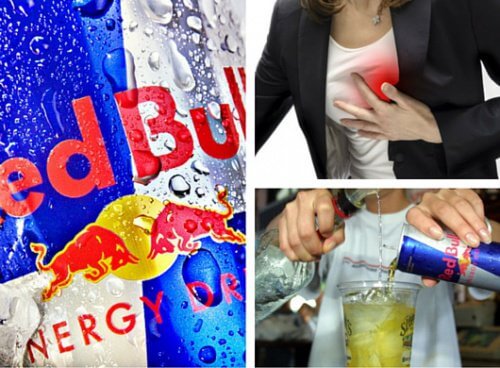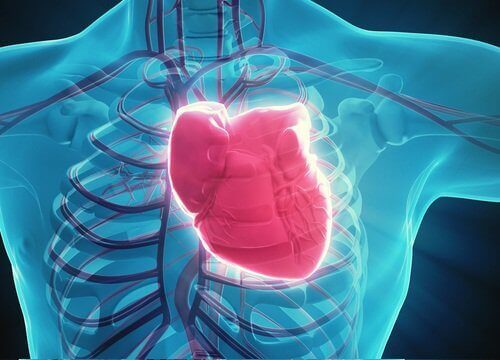The Effects of Energy Drinks on Your Body


Reviewed and approved by the doctor Maricela Jiménez López
Energy drinks, such as Red Bull, have become very popular for a couple of decades. Scientists have been studying their side effects on health ever since then.
Red Bull is perhaps one of the most famous and most-consumed around the world. It stimulates people’s brains when they have to undergo intense physical exertion or various stressful situations.
For example, people often consume it during a long hard day at work, or while doing homework, or before an exam.
It’s true that this drink works and serves to prolong the energies when the body needs it. However, several scientific experiments that we will show below have shown that a single can causes alterations in several body functions.
Drinking energy drinks daily can lead to the development of various cardiovascular problems.
You might like: Natural Energy Drink to Strengthen Bones
What are energy drinks and what do they contain?

A study carried out by the University of Vic – Central University of Catalonia (Spain) has come to the conclusion that the information we receive about energy drinks is insufficient. According to the research, only 76.3% of adolescent students are aware of the state of nervousness and anxiety that can result.
Energy drinks are commercial soft drinks that combine substances such as caffeine, amino acids (such as taurine), carbohydrates (such as glucuronolactone, a glucose derivative), vitamins and, in some cases, extracts from medicinal plants such as ginseng or guarana.
A single can of these drinks contains high amounts of caffeine, equivalent to four cups of coffee, as this research by the OCU (Consumers’ and Users’ Organisation) states.
A healthy person can consume between 100 and 300 mg of caffeine a day and a maximum of 400 mg in moderation. The OCU specialists agree that this high dose only poses a health risk if ingested continuously over time, and as long as it is not combined with other substances such as alcohol.
What are the main damaging substances present in beverages such as Red Bull?
In the case of energy drinks, one of the main problems lies in the combination of caffeine with other substances that can be quite dangerous. This is the case, for example, with aspartame, a compound that has been shown to be neurotic, metabolic and hypoallergenic.
It also tends to generate a certain addiction, as this study by the Universidad Peruana Unión states, making the consumer feel unsatisfied with only one can. This can cause the consumer to have several cans to satisfy his need.
The effects of energy drinks on your health

A ban on energy drinks in certain countries
An estimated 3.5 million cans of Red Bull have been distributed in 143 countries around the world.
However, Red Bull and other energy drinks have been banned in some places. Evidence that confirms the negative health effects of these beverages has worried the authorities of different countries. Today, energy drinks are prohibited in Norway, Denmark, and Uruguay.
In Kuwait, energy drinks became prohibited for minors under the age of 16 after two members of the national squash team died of heart attacks after consuming these drinks.
The main dangers of energy drinks
We’ve already seen the damage that drinks like Red Bull can have on your body. However, it’s necessary to see what specific harmful effects their consumption may imply.
While we still need more scientific evidence to determine how dangerous these beverages can be, in the meantime, here are some warnings to consumers about their possible effects.
Effects on the digestive system
- Energy drinks don’t hydrate you. The diuretic effect of the caffeine actually increases the risk of dehydration in these cases. This study conducted by the University of Antioquia in Colombia affirms this.
- Mixing RedBull and other energy drinks with alcohol can be lethal because it directly attacks the liver. This is confirmed by this study from the Autonomous University of Barcelona.
Effects on the circulatory system
- They should not be ingested after intense physical exercise. This is because the energizing function accelerates the heart rate and can cause a lethal heart attack.
- Due to its high content of compounds that dilute the blood, excessive consumption can cause a cerebral hemorrhage. This is what this study carried out by the Spanish Society of Cardiology affirms. The reason for this is that the heart has less energy to pump blood, but physical effort increases.
- People with cardiovascular problems, pregnancy, chronic fatigue syndrome, caffeine sensitivity, and blood clotting disorder should avoid them completely.
- Tachycardia, palpitations or increased blood pressure can also be consequences of drinking energy drinks.
Damage to the nervous system
- Drinking a can of these drinks every day increases the risk of developing irreversible nerve-related diseases.
- It can also cause insomnia, nervousness, or lack of motor coordination.
If, despite knowing the negative effects of energy drinks, you still want to consume them, do so with great caution and in consultation with a specialist!
All cited sources were thoroughly reviewed by our team to ensure their quality, reliability, currency, and validity. The bibliography of this article was considered reliable and of academic or scientific accuracy.
- Anton, S. D., Martin, C. K., Han, H., Coulon, S., Cefalu, W. T., Geiselman, P., & Williamson, D. A. (2010). Effects of stevia, aspartame, and sucrose on food intake, satiety, and postprandial glucose and insulin levels. Appetite, 55(1), 37-43. https://www.sciencedirect.com/science/article/abs/pii/S0195666310000826
- Attila, S., & Çakir, B. (2011). Energy-drink consumption in college students and associated factors. Nutrition, 27(3), 316-322. https://www.sciencedirect.com/science/article/abs/pii/S0899900710000675
- Gunja, N., & Brown, J. A. (2012). Energy drinks: health risks and toxicity. Medical Journal of Australia, 196(1), 46-49. https://onlinelibrary.wiley.com/doi/abs/10.5694/mja11.10838
- Reissig, C. J., Strain, E. C., & Griffiths, R. R. (2009). Caffeinated energy drinks—a growing problem. Drug and alcohol dependence, 99(1-3), 1-10. https://www.sciencedirect.com/science/article/abs/pii/S0376871608002858
- Sánchez-Socarrás, V., Blanco, M., Bosch, C., & Vaqué, C. (2016). Conocimientos sobre las bebidas energéticas: una experiencia educativa con estudiantes de secundaria básica de Barcelona, España. Revista Española de Nutrición Humana y Dietética, 20(4), 263-272. http://scielo.isciii.es/scielo.php?pid=S2174-51452016000400002&script=sci_arttext&tlng=pt
- Quispe, J. C. M. Consumo de las bebidas energizantes y los efectos adversos en el organismo del consumidor. https://www.researchgate.net/publication/326315222_Consumo_de_las_bebidas_energizantes_y_los_efectos_adversos_en_el_organismo_del_consumidor
- Sánchez, J. C., Romero, C. R., Arroyave, C. D., García, A. M., Giraldo, F. D., & Sánchez, L. V. (2015). Bebidas energizantes: efectos benéficos y perjudiciales para la salud. Perspectivas en nutrición humana, 17(1), 79-91. http://www.scielo.org.co/pdf/penh/v17n1/v17n1a7.pdf
- Iglesias-Lepine, M. L., Epelde, F., Espinosa, J., & Mariñosa, M. (2013). Consumo de bebidas energizantes con alcohol, una mezcla arriesgada. Medicina Clínica, 141(3), 135-136. https://www.elsevier.es/es-revista-medicina-clinica-2-articulo-consumo-bebidas-energizantes-con-alcohol-S0025775312009517
This text is provided for informational purposes only and does not replace consultation with a professional. If in doubt, consult your specialist.








